Korean BBQ Sauce is a luscious blend of sweet, savory, and umami flavors that brings a burst of excitement to any meal. This versatile sauce is perfect for marinating meats, drizzling on grilled vegetables, or even as a dipping sauce. Its rich, sticky texture and bold flavor profile make it an essential addition to any kitchen, especially for those who love the vibrant tastes of Korean cuisine. Whether you’re hosting a backyard barbecue or simply looking to elevate your weeknight dinner, this homemade Korean BBQ sauce is sure to impress.
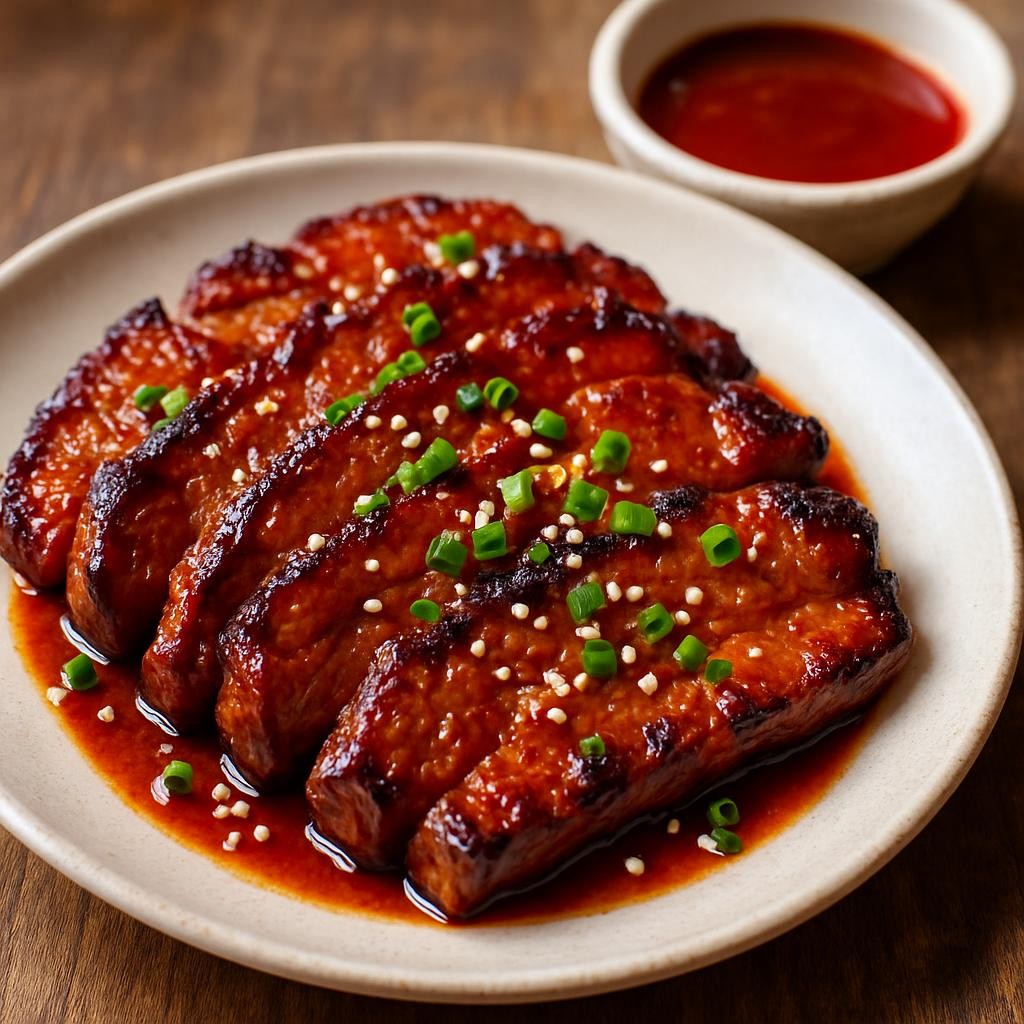
Why You Will Love This Recipe
You will absolutely adore this Korean BBQ sauce for its fantastic flavor and simplicity. The balance of sweet and savory notes makes it incredibly versatile, allowing you to use it with various proteins, from beef and chicken to tofu and vegetables. The ease of preparation means that even novice cooks can whip it up in no time. Plus, this recipe is perfect for those following a gluten-free or dairy-free diet as you can easily find alternatives for any necessary ingredients. With just a few pantry staples and minimal effort, you can create a delicious sauce that transforms any meal into a culinary experience.
Tips and Tricks
To maximize flavor in your Korean BBQ sauce, consider the following tips:
- Use Fresh Ingredients: Fresh garlic and ginger will enhance the depth of flavor compared to their powdered counterparts.
- Marinate for Optimal Taste: For meats, allow them to marinate in the sauce for at least 30 minutes (or up to overnight) for the best results.
- Adjust Sweetness: Depending on your taste preference, feel free to adjust the amount of sugar or honey in the sauce.
- Thickening It Up: If you prefer a thicker sauce, consider simmering it on low heat for a few extra minutes to reduce and concentrate the flavors.
Make Ahead Tips
Perfect for meal preppers, this Korean BBQ sauce can be made ahead of time and stored for future use. Prepare the sauce up to a week in advance and store it in an airtight container in the refrigerator. If you want to store it for longer, it freezes well for up to three months. Just thaw it in the fridge overnight before use. This allows the flavors to meld and deepen, making your BBQ sauce even more delicious.
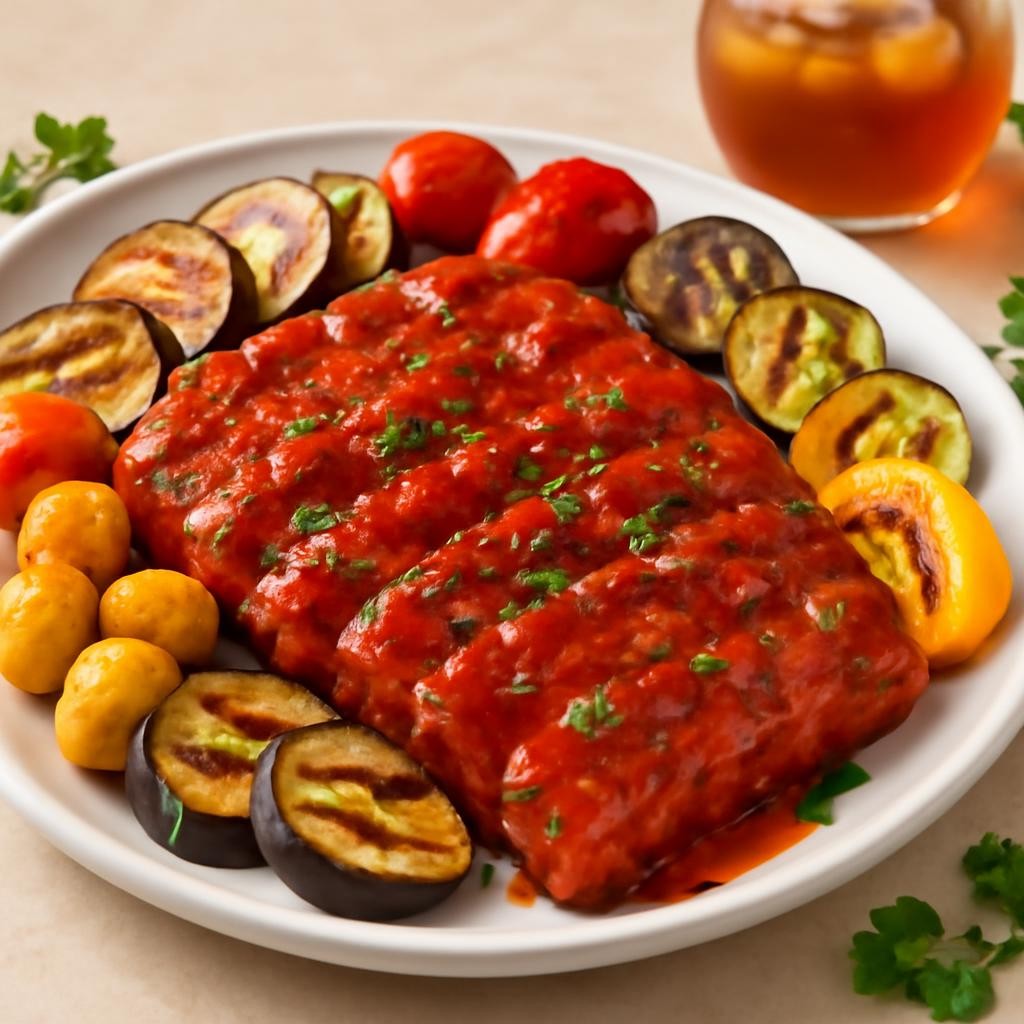
Recipe Variations
Feel free to get creative with your Korean BBQ sauce! Here are some variations:
- Spicy Version: Add gochujang (Korean chili paste) or red pepper flakes for a spicy kick.
- Fruit-Infused: Blend in some pureed fruits like peaches or pineapples for a fruity twist.
- Vegan Adaptation: Substitute honey with maple syrup or agave nectar for a vegan-friendly option.
- Herbaceous Touch: Incorporate fresh herbs like cilantro or green onions for an aromatic lift.
How to Serve
To serve your Korean BBQ sauce, drizzle it over grilled meats or vegetables, or use it as a dipping sauce for fresh spring rolls. For a beautiful presentation, serve it in a small bowl alongside your main dish. Garnish with sesame seeds and chopped green onions for an added pop of color and flavor. Pair it with a side of steamed rice or lettuce wraps for an authentic experience.
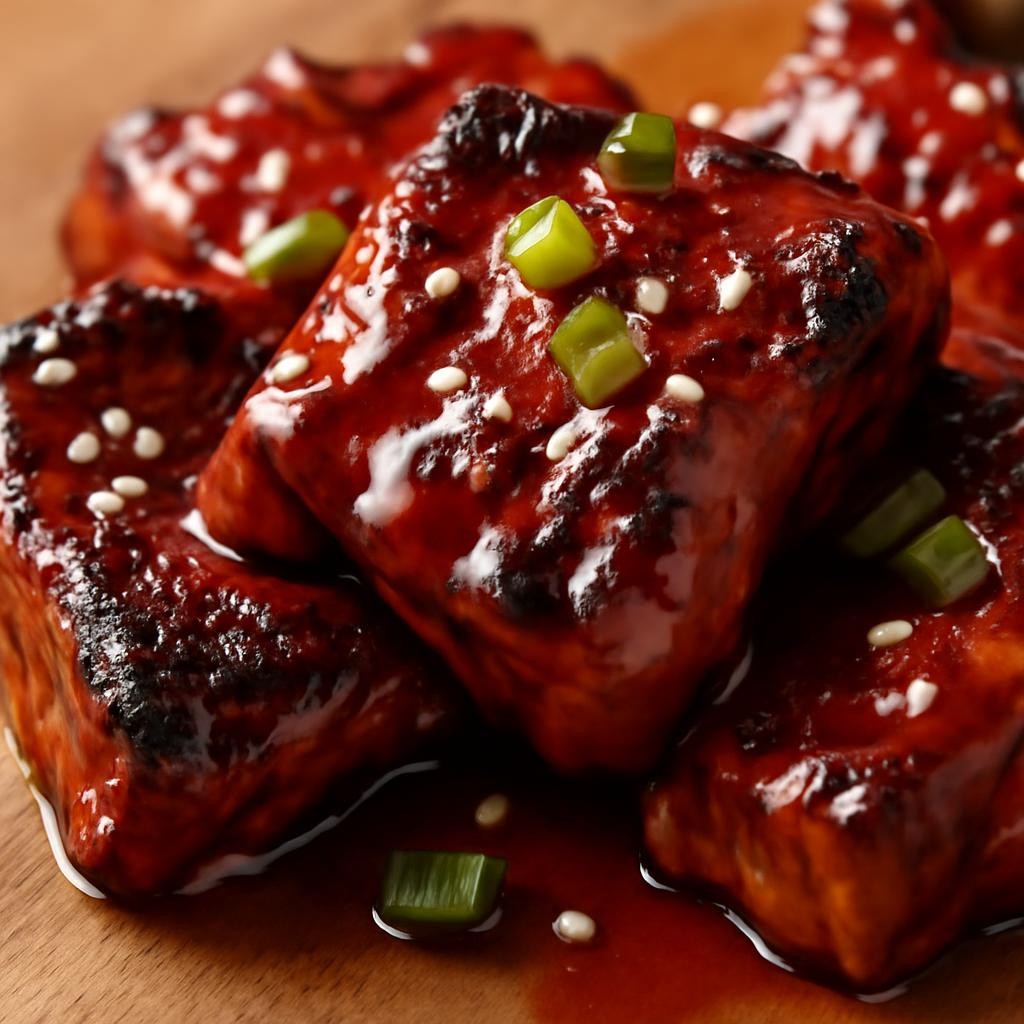
Pairing Suggestions
For drink pairings, consider serving your meal with a crisp, refreshing Korean beer like Hite or Cass. If you prefer cocktails, a light Soju with tonic water and lime makes for a delightful accompaniment. For those who enjoy tea, a chilled barley tea complements the meal perfectly. As for side dishes, kimchi, pickled vegetables, and a simple cucumber salad would all make excellent companions.
How to Store
Store any leftover Korean BBQ sauce in an airtight container in the refrigerator for up to one week. If you want to keep it longer, it can be frozen in ice cube trays and then transferred to a resealable bag for up to three months. To reheat, simply thaw in the fridge overnight and warm it gently on the stovetop or microwave, stirring to recombine.
Equipment Needed
You will need a mixing bowl for combining your ingredients and a whisk or spoon for stirring. A small saucepan is helpful if you choose to simmer the sauce for a thicker consistency. If you plan to marinate meat, having a resealable plastic bag or a glass dish with a lid will make the process easier.
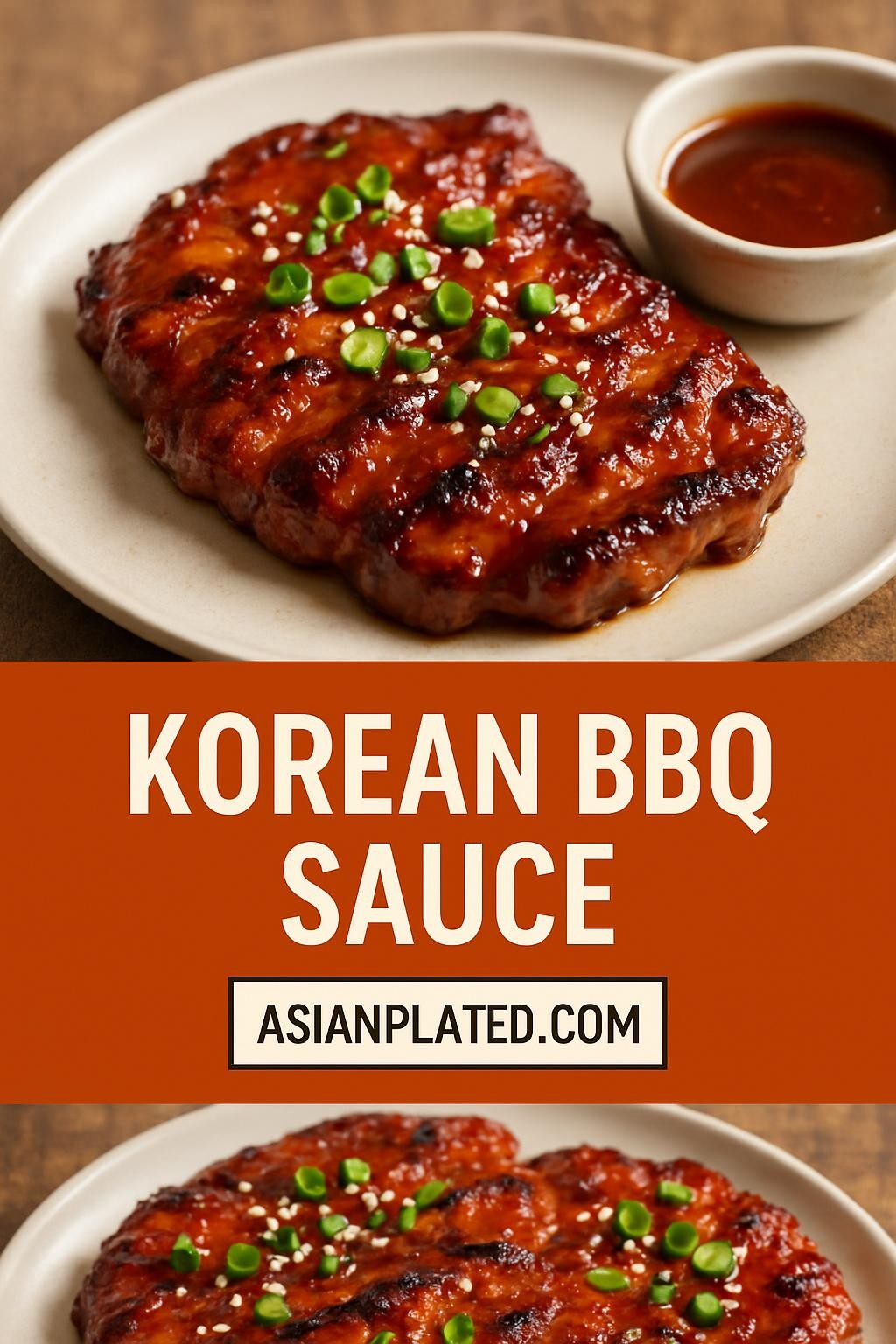
Dietary Adaptations
To make this Korean BBQ sauce suitable for various dietary needs:
- Gluten-Free: Use tamari or coconut aminos instead of soy sauce.
- Nut-Free: Ensure your sesame oil is nut-free or substitute with a vegetable oil.
- Low-Sugar: Use a sugar substitute like stevia or erythritol to lower the sugar content.
- Vegan: As mentioned, substitute honey with maple syrup.
Seasonal Adaptations
In winter, consider adding seasonal ingredients like roasted garlic for a deeper flavor. During summer, fresh herbs like basil or mint can be blended in for a refreshing twist. You can also use seasonal fruits such as peaches or apricots in the sauce to incorporate a fruity element.
Recipe FAQs
Can I substitute soy sauce with something else? Yes! Tamari or coconut aminos work well for a gluten-free option.
How long does the sauce last in the fridge? It can be stored in the refrigerator for up to one week.
What can I use if I don’t have rice vinegar? You can substitute with apple cider vinegar or white wine vinegar, though the flavor will vary slightly.
Can I make this sauce spicier? Absolutely! Add more gochujang or red pepper flakes to suit your heat preference.
Korean BBQ Sauce
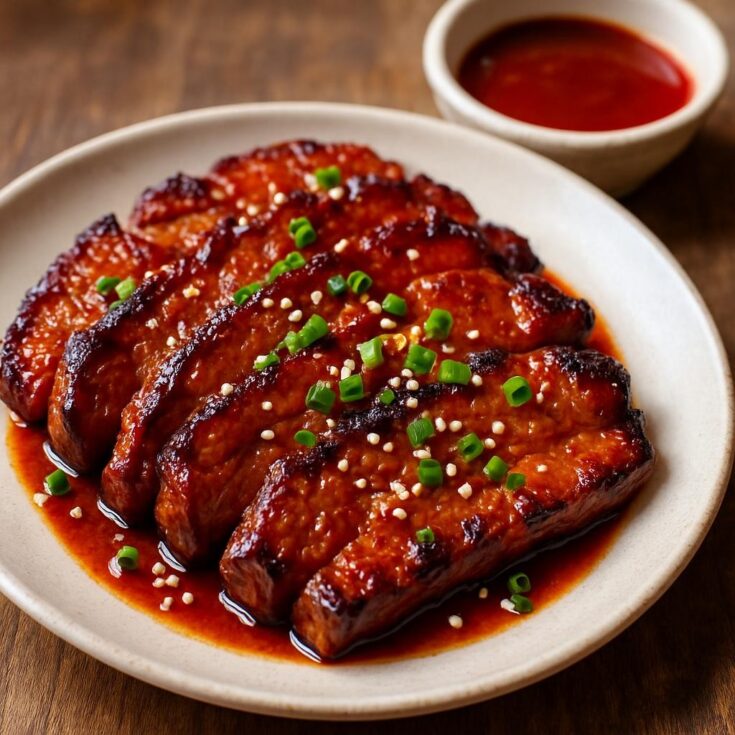
Korean BBQ Sauce is a luscious blend of sweet, savory, and umami flavors that brings a burst of excitement to any meal.
Ingredients
- ½ cup soy sauce (or tamari for gluten-free)
- ¼ cup brown sugar or honey
- 2 tablespoons sesame oil
- 2 tablespoons rice vinegar
- 4 cloves garlic, minced
- 1 tablespoon fresh ginger, minced
- 1 tablespoon sesame seeds
- 1 teaspoon black pepper
- Optional: 1 tablespoon gochujang for a spicy version
Instructions
- In a mixing bowl, combine soy sauce, brown sugar (or honey), sesame oil, and rice vinegar.
- Add minced garlic and ginger to the mixture, stirring until well combined.
- If desired, add gochujang for a spicy kick and mix thoroughly.
- Stir in sesame seeds and black pepper.
- Taste the sauce and adjust sweetness or seasoning as preferred.
- For a thicker sauce, transfer to a small saucepan and simmer over low heat for 5-10 minutes until it reaches your desired consistency.
- Remove from heat and let cool before using or storing.
Nutrition Information:
Yield: 1 Serving Size: 1Amount Per Serving: Calories: 681Total Fat: 32gSaturated Fat: 5gTrans Fat: 0gUnsaturated Fat: 26gCholesterol: 0mgSodium: 7917mgCarbohydrates: 91gFiber: 3gSugar: 72gProtein: 14g
Asianplated.com, occasionally offers nutritional information for recipes contained on this site. This information is provided as a courtesy and is an estimate only. This information comes from online calculators. Although allchickenrecipes.com attempts to provide accurate nutritional information, these figures are only estimates.
Final Thoughts
In conclusion, this homemade Korean BBQ sauce is a delectable addition to your cooking repertoire that promises to elevate your meals with its unique flavors. Whether you’re grilling with friends, prepping for a family dinner, or just looking for a quick way to enhance your weeknight meals, this sauce is a must-try. With its easy preparation and delicious results, you’ll find yourself reaching for this recipe time and time again. Enjoy the journey of flavors and the joy of sharing great food!

